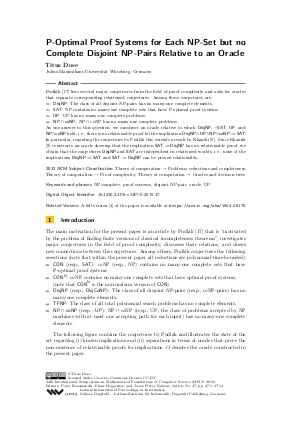P-Optimal Proof Systems for Each NP-Set but no Complete Disjoint NP-Pairs Relative to an Oracle
Author Titus Dose
-
Part of:
Volume:
44th International Symposium on Mathematical Foundations of Computer Science (MFCS 2019)
Part of: Series: Leibniz International Proceedings in Informatics (LIPIcs)
Part of: Conference: Mathematical Foundations of Computer Science (MFCS) - License:
 Creative Commons Attribution 3.0 Unported license
Creative Commons Attribution 3.0 Unported license
- Publication Date: 2019-08-20
File

PDF
LIPIcs.MFCS.2019.47.pdf
- Filesize: 491 kB
- 14 pages
Document Identifiers
Related Versions
-
A full version [Dose, 2019] of the paper is available at https://arxiv.org/abs/1904.06175.
Subject Classification
ACM Subject Classification
- Theory of computation → Problems, reductions and completeness
- Theory of computation → Proof complexity
- Theory of computation → Oracles and decision trees
Keywords
- NP-complete
- proof systems
- disjoint NP-pair
- oracle
- UP
Metrics
- Access Statistics
-
Total Accesses (updated on a weekly basis)
0Document
0Metadata
Abstract
Pudlák [P. Pudlák, 2017] lists several major conjectures from the field of proof complexity and asks for oracles that separate corresponding relativized conjectures. Among these conjectures are: - DisjNP: The class of all disjoint NP-pairs has no many-one complete elements. - SAT: NP contains no many-one complete sets that have P-optimal proof systems. - UP: UP has no many-one complete problems. - NP cap coNP: NP cap coNP has no many-one complete problems. As one answer to this question, we construct an oracle relative to which DisjNP, neg SAT, UP, and NP cap coNP hold, i.e., there is no relativizable proof for the implication DisjNP wedge UP wedge NP cap coNP ==> SAT. In particular, regarding the conjectures by Pudlák this extends a result by Khaniki [Khaniki, 2019]. Since Khaniki [Khaniki, 2019] constructs an oracle showing that the implication SAT ==> DisjNP has no relativizable proof, we obtain that the conjectures DisjNP and SAT are independent in relativized worlds, i.e., none of the implications DisjNP ==> SAT and SAT ==> DisjNP can be proven relativizably.
Cite As Get BibTex
Titus Dose. P-Optimal Proof Systems for Each NP-Set but no Complete Disjoint NP-Pairs Relative to an Oracle. In 44th International Symposium on Mathematical Foundations of Computer Science (MFCS 2019). Leibniz International Proceedings in Informatics (LIPIcs), Volume 138, pp. 47:1-47:14, Schloss Dagstuhl – Leibniz-Zentrum für Informatik (2019)
https://doi.org/10.4230/LIPIcs.MFCS.2019.47
BibTex
@InProceedings{dose:LIPIcs.MFCS.2019.47,
author = {Dose, Titus},
title = {{P-Optimal Proof Systems for Each NP-Set but no Complete Disjoint NP-Pairs Relative to an Oracle}},
booktitle = {44th International Symposium on Mathematical Foundations of Computer Science (MFCS 2019)},
pages = {47:1--47:14},
series = {Leibniz International Proceedings in Informatics (LIPIcs)},
ISBN = {978-3-95977-117-7},
ISSN = {1868-8969},
year = {2019},
volume = {138},
editor = {Rossmanith, Peter and Heggernes, Pinar and Katoen, Joost-Pieter},
publisher = {Schloss Dagstuhl -- Leibniz-Zentrum f{\"u}r Informatik},
address = {Dagstuhl, Germany},
URL = {https://drops.dagstuhl.de/entities/document/10.4230/LIPIcs.MFCS.2019.47},
URN = {urn:nbn:de:0030-drops-109918},
doi = {10.4230/LIPIcs.MFCS.2019.47},
annote = {Keywords: NP-complete, proof systems, disjoint NP-pair, oracle, UP}
}
Author Details
References
- O. Beyersdorff, J. Köbler, and J. Messner. Nondeterministic functions and the existence of optimal proof systems. Theor. Comput. Sci., 410(38-40):3839-3855, 2009. URL: https://doi.org/10.1016/j.tcs.2009.05.021.
-
S. Cook and R. Reckhow. The relative efficiency of propositional proof systems. Journal of Symbolic Logic, 44:36-50, 1979.

- T. Dose. Complete Disjoint coNP-Pairs but no Complete Total Polynomial Search Problems Relative to an Oracle. arXiv e-prints, pages 1-13, March 2019. URL: http://arxiv.org/abs/1903.11860.
- T. Dose. P-Optimal Proof Systems for Each Set in NP but no Complete Disjoint NP-pairs Relative to an Oracle. arXiv e-prints, pages 1-19, April 2019. URL: http://arxiv.org/abs/1904.06175.
-
T. Dose and C. Glaßer. NP-completeness, proof systems, and disjoint NP-pairs. Technical Report 19-050, Electronic Colloquium on Computational Complexity (ECCC), 2019.

-
C. Glaßer, A. L. Selman, S. Sengupta, and L. Zhang. Disjoint NP-Pairs. SIAM Journal on Computing, 33(6):1369-1416, 2004.

-
J. Grollmann and A. L. Selman. Complexity measures for public-key cryptosystems. SIAM Journal on Computing, 17(2):309-335, 1988.

- J. Hartmanis and L. A. Hemachandra. Complexity Classes without Machines: On Complete Languages for UP. Theor. Comput. Sci., 58:129-142, 1988. URL: https://doi.org/10.1016/0304-3975(88)90022-9.
- E. Khaniki. New relations and separations of conjectures about incompleteness in the finite domain. arXiv e-prints, pages 1-25, April 2019. URL: http://arxiv.org/abs/1904.01362.
-
J. Köbler and J. Messner. Is the Standard Proof System for SAT P-Optimal? In S. Kapoor and S. Prasad, editors, FSTTCS 2000: Foundations of Software Technology and Theoretical Computer Science, pages 361-372, Berlin, Heidelberg, 2000. Springer Berlin Heidelberg.

-
J. Köbler, J. Messner, and J. Torán. Optimal proof systems imply complete sets for promise classes. Information and Computation, 184(1):71-92, 2003.

-
J. Krajícek and P. Pudlák. Propositional Proof Systems, the Consistency of First Order Theories and the Complexity of Computations. Journal of Symbolic Logic, 54:1063-1079, 1989.

-
M. Ogiwara and L. Hemachandra. A complexity theory of feasible closure properties. Journal of Computer and System Sciences, 46:295-325, 1993.

-
C. M. Papadimitriou. Computational complexity. Addison-Wesley, Reading, Massachusetts, 1994.

-
P. Pudlák. On the lengths of proofs of consistency. In Collegium Logicum, pages 65-86. Springer Vienna, 1996.

- P. Pudlák. Logical Foundations of Mathematics and Computational Complexity - A Gentle Introduction. Springer monographs in mathematics. Springer, 2013. URL: https://doi.org/10.1007/978-3-319-00119-7.
-
P. Pudlák. Incompleteness in the Finite Domain. The Bulletin of Symbolic Logic, 23(4):405-441, 2017.

-
A. A. Razborov. On provably disjoint NP-pairs. Electronic Colloquium on Computational Complexity (ECCC), 1(6), 1994.

